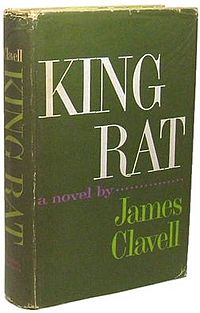King Rat
by James Clavell
The novel opens in early 1945. Peter Marlowe, a young British RAF Flight Lieutenant, has been a Malay. Marlowe's languages, intelligence, honesty, and winning personality cause King to befriend him and attempt to involve him in black market deals, which bring Marlowe to the attention of Robin Grey, a British officer and Provost Marshal of the camp, who has developed a Javert-like obsession with King and hopes to arrest him for violating camp regulations. Grey is attempting to maintain military discipline among the prisoners and sees King as the antithesis of his beliefs. As the son of a [[working-class]] family, Grey follows the rules for their own sake using his position as Provost Marshal to gain a status otherwise unavailable to him in British society.
Despite being an enlisted man and undistinguished in civilian life, King has become a major power in the closed society of the P.O.W. camp through his charisma and intelligence. Trading with Korean guards, local Malay villagers, and other prisoners for food, clothing, information, and what few luxuries are available, King keeps himself and his fellow American prisoners alive. Senior officers come to him for help in selling their valuables to buy food, and other officers are secretly on his payroll. Marlowe is initially put off by King's perspective and behaviour, which clash with the British upper class ideals he has been taught. He turns down a lucrative business partnership with King because "Marlowes aren't tradesmen. It just isn't done, old boy". Marlowe soon understands that King is not the thief and con artist that Grey would have him believe. Rather, King asks for the best of each man and rewards him accordingly, irrespective of class or position.
Through the experiences of Marlowe, King, and other characters, the novel offers a vivid, often disturbing portrayal of men brought to the edge of survival by a brutal environment. The P.O.W.s are given nothing by the Japanese other than filthy huts to live in and the bare minimum of food. Officers from various parts of Britain's Asian empire, accustomed to having native servants provide them with freshly laundered uniforms daily, are reduced to wearing rags and homemade shoes. For most, the chief concern is obtaining enough food to stay alive from day to day and avoiding disease or injury, since almost no medical care is available. Some are degraded and come close to losing their humanity, while others display levels of courage and compassion beyond expectations. Some literally steal food out the mouths of their comrades, while others give away what they have or take terrible risks to help their friends.
King decides he and his friends should breed rats to sell for food. His comrades, though nearly starving themselves, are repulsed at the idea of eating rat meat, so King comes up with the plan of only selling the meat to officers without telling them the true source. A group of officers who stole money from their underlings are later seen greedily enjoying a meal of "Rusa tikus" not knowing they are actually eating rat meat. When the camp is ultimately liberated, most of the soldiers have trouble adjusting to freedom. King loses his power and is shunned by the others. Grey ironically thanks King on the grounds that his hatred of King was the only thing keeping him alive. At the end the rats are abandoned in their cages when the camp is abandoned. The final scene shows the rats consuming each other one by one, with the final survivor becoming "king of the rats".
